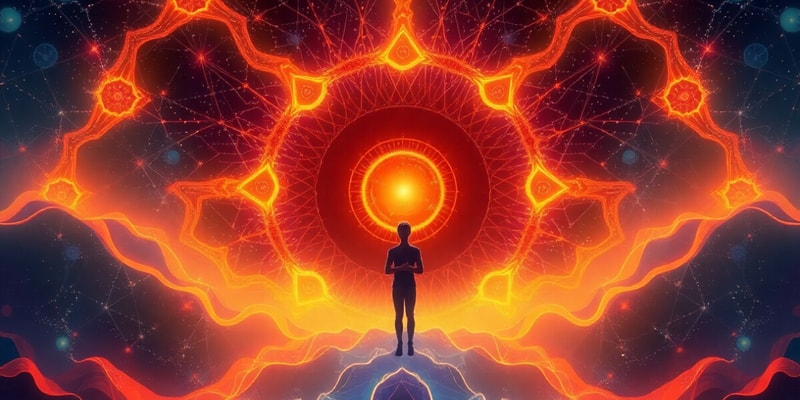Podcast
Questions and Answers
What is the primary effect of psychedelic drugs on self-consciousness?
What is the primary effect of psychedelic drugs on self-consciousness?
Which neurotransmitter do psychedelics bind to?
Which neurotransmitter do psychedelics bind to?
What happens to the default mode network (DMN) during experiences of drug-induced ego dissolution (DIED)?
What happens to the default mode network (DMN) during experiences of drug-induced ego dissolution (DIED)?
What is the entropic brain theory associated with ordinary waking consciousness?
What is the entropic brain theory associated with ordinary waking consciousness?
Signup and view all the answers
What is the proposed responsible mechanism for the expansion in 'consciousness' associated with drug-induced ego dissolution?
What is the proposed responsible mechanism for the expansion in 'consciousness' associated with drug-induced ego dissolution?
Signup and view all the answers
What is the role of the default mode network (DMN) in ordinary waking consciousness?
What is the role of the default mode network (DMN) in ordinary waking consciousness?
Signup and view all the answers
What is the effect of psychedelic drugs on the default mode network (DMN)?
What is the effect of psychedelic drugs on the default mode network (DMN)?
Signup and view all the answers
What is the impact of drug-induced ego dissolution on the neural circuits within the default mode network (DMN)?
What is the impact of drug-induced ego dissolution on the neural circuits within the default mode network (DMN)?
Signup and view all the answers
What is the proposed mechanism for the expansion in 'consciousness' associated with drug-induced ego dissolution?
What is the proposed mechanism for the expansion in 'consciousness' associated with drug-induced ego dissolution?
Signup and view all the answers
What is the impact of psychedelic drugs on neural plasticity?
What is the impact of psychedelic drugs on neural plasticity?
Signup and view all the answers
What did Guilio Tononi pioneer in consciousness research?
What did Guilio Tononi pioneer in consciousness research?
Signup and view all the answers
What did the perturbational complexity index measure using the 'zap and zip' technique suggest?
What did the perturbational complexity index measure using the 'zap and zip' technique suggest?
Signup and view all the answers
What is a potential application of psychedelic therapy?
What is a potential application of psychedelic therapy?
Signup and view all the answers
What did early studies, including Abram Hoffer's research, suggest about psychedelic therapy?
What did early studies, including Abram Hoffer's research, suggest about psychedelic therapy?
Signup and view all the answers
What have recent studies indicated about the effectiveness of psilocybin in treating addiction?
What have recent studies indicated about the effectiveness of psilocybin in treating addiction?
Signup and view all the answers
What is a notable effect of psilocybin in treating major depression?
What is a notable effect of psilocybin in treating major depression?
Signup and view all the answers
What is a potential concern associated with the use of ketamine in treating depression and addiction?
What is a potential concern associated with the use of ketamine in treating depression and addiction?
Signup and view all the answers
What led to a moratorium on research in psychedelics from the early 1970s to the early 2000s?
What led to a moratorium on research in psychedelics from the early 1970s to the early 2000s?
Signup and view all the answers
What did the University of California, Berkeley launch in 2020 to conduct research on the biological bases of cognition, perception, and emotion in the human brain using psychedelics?
What did the University of California, Berkeley launch in 2020 to conduct research on the biological bases of cognition, perception, and emotion in the human brain using psychedelics?
Signup and view all the answers
What are the plans for collaboration with the Graduate Theological Union regarding psychedelics?
What are the plans for collaboration with the Graduate Theological Union regarding psychedelics?
Signup and view all the answers
What is the drug action of MDMA?
What is the drug action of MDMA?
Signup and view all the answers
What are the positive effects of LSD?
What are the positive effects of LSD?
Signup and view all the answers
Which drug may be effective for treating PTSD?
Which drug may be effective for treating PTSD?
Signup and view all the answers
What is the potential damage associated with MDMA?
What is the potential damage associated with MDMA?
Signup and view all the answers
Which drug action stimulates serotonin receptors?
Which drug action stimulates serotonin receptors?
Signup and view all the answers
What is the effect of a single administration of psilocybin?
What is the effect of a single administration of psilocybin?
Signup and view all the answers
What is the history of hallucinogens usage?
What is the history of hallucinogens usage?
Signup and view all the answers
What are the adverse effects of LSD?
What are the adverse effects of LSD?
Signup and view all the answers
What are the effects of psilocybin?
What are the effects of psilocybin?
Signup and view all the answers
What are the positive effects of MDMA?
What are the positive effects of MDMA?
Signup and view all the answers
Study Notes
Advancements in Consciousness Research and Psychedelic Therapy
- Guilio Tononi pioneered the "zap and zip" technique to measure consciousness by applying intense magnetic pulses to the scalp and recording the resulting brain activity using EEG sensors.
- The perturbational complexity index measured using the zap and zip technique was significantly higher in awake volunteers than in deeply asleep or anesthetized individuals, suggesting a correlation between information processing and consciousness levels.
- Psychedelic therapy, associated with expanded states of consciousness and increased cognitive flexibility, shows potential for treating disorders stemming from rigid thought patterns, such as trauma, addiction, and depression.
- Early studies, including Abram Hoffer's research in the 1960s, suggested that psychedelic therapy, using substances like mescaline and psilocybin, could lead to significant improvements in treating addiction and other psychological disorders.
- Recent studies have indicated the effectiveness of psilocybin in treating addiction, with an 80% success rate in smoking cessation compared to the 35% success rate of conventional anti-smoking drugs.
- Psilocybin has also shown promise in treating major depression, with immediate effects that are about four times larger than traditional antidepressants and without the weeks or months of delay associated with other treatments.
- Ketamine, another psychedelic substance, has also shown effectiveness in treating treatment-resistant depression and addiction, but its effects tend to wear off relatively quickly, requiring repeated infusions and potentially leading to cognitive side effects and addiction.
- A moratorium on research in psychedelics from the early 1970s to the early 2000s was due to sociopolitical factors, but there has been a resurgence of interest and research in recent years, particularly in the use of substances like MDMA and LSD to treat various psychological and emotional disorders.
- The University of California, Berkeley launched the Center for the Science of Psychedelics in 2020 to conduct research on the biological bases of cognition, perception, and emotion in the human brain using psychedelics, with a focus on psilocybin initially.
- The center also plans to explore the integration of psychedelics with psychotherapy for treating psychological disorders, as well as the potential of these compounds to improve cognitive flexibility, alter visual perception, engender feelings of awe, and change patterns of brain activity.
- There are plans for collaboration with the Graduate Theological Union and the eventual training of guides or facilitators in the cultural, contemplative, and spiritual care dimensions of psychedelics.
- The resurgence of interest in psychedelics has led to research on their potential therapeutic use, with a focus on substances like psilocybin, MDMA, and LSD to treat a wide range of psychological and emotional disorders, leading to the establishment of dedicated research centers and initiatives like the Center for the Science of Psychedelics at the University of California, Berkeley.
Studying That Suits You
Use AI to generate personalized quizzes and flashcards to suit your learning preferences.
Description
"Advancements in Consciousness Research and Psychedelic Therapy" Quiz Test your knowledge on the latest developments in consciousness research, including the "zap and zip" technique for measuring consciousness and the potential of psychedelic therapy in treating psychological disorders. Learn about pioneering researchers, recent studies, and the resurgence of interest in psychedelics for therapeutic purposes.




